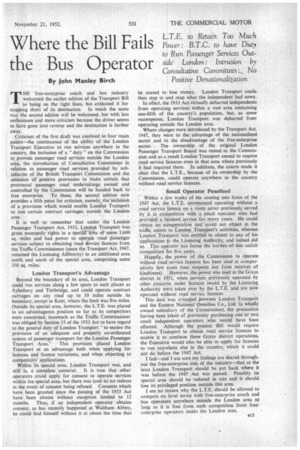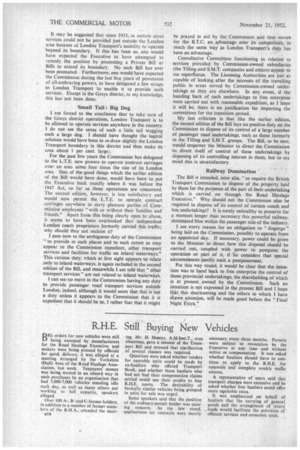Where the Bill Fails the Bus Operator
Page 47

Page 48

If you've noticed an error in this article please click here to report it so we can fix it.
By John Manley Birch THE free-enterprise coach and bus industry welcomed the earlier edition of the Transport Bill as being on the right lines, but -criticized it for stopping short of its destination. In much the same way the second edition will be welcomed, but with less enthusiasm and more criticism because the driver seems to have gone into reverse and the destination is farther away.
Criticism of the first draft was confined to four main points—the continuance of the ability of the London Transport Executive to run services anywhere in the country, the inclusion of a " duty " on the Commission to provide passenger road services outside the London area, the introduction of Consultative Committees in relation to passenger road services provided by subsidiaries of the British Transport Commission and the omission of positive provisions to make certain that provincial passenger roadundertakings owned and controlled by the Commission will be handed back to free enterprise. To these, the second edition now provides a fifth point for criticism, namely, the inclusion of a provision which would enable London Transport to run certain contract carriages outside the London area.
It is well to remember that under the London Passenger Transport Act, 1933, London Transport was given monopoly rights in a special area of some 1,600 sq. miles and had power to operate road passenger services subject to obtaining road lervice licences from the Traffic Commissioner (since the Transport Act, 1947, renamed the Licensing Allthority) in an additional area north and south of the special area, comprising some 350 sq. miles.
London Transport's Advantage Beyond the boundary of its area, London Transport could run services along a few spurs to such places as Aylesbury and Ton bridge, and could operate contract carriages on any road up to 10 miles outside its boundary, except in Kent, where the limit was five miles. Outside its special area, however, the L.T.E. was placed in an advantageous position so far as its competitors were concerned, inasmuch as the Traffic Commissioner was obliged by Section 15 of the 1933 Act to have regard to the general duty of London Transport "to secure the provision of an 'adequate and properly co-ordinated system of passenger transport for the London Passenger Transport Area." • This provision placed London Transport at an advantage both When applying for licences and licence variations, and when objecting to competitors' applications.
Within its special area, London Transport was, and still is, a complete autocrat. It is true that other operators could apply for consent to operate services within the special area, but there was (and is) no redress in the event of consent being refused. Consents which have been granted since the passing of the 1933 Act have been almost without exception limited to 12 months. Thus, if an independent operator obtains consent, as has recently happened at Waltham Abbey, he could find himself without it at about the time that he ceased to lose money. London Transport coula then step in and reap what the independent had sown.
In effect, the 1933 Act virtually debarred independents from operating Services within a vast area containing one-fifth of the country's population, but, as some recompense, London Transport was debarred from operating outside the London area.
Where changes were introduced by the Transport Act. 1947, they were to the advantage of the nationalized sector and to the disadvantage of the free-enterprise sector. The ownership of the original London Passenger Transport Board was vested in the Commission and as a result London Transport ceased to require road service licences even in that area where previously it had required them. In addition, the courts made it clear that the L.T.E., because of its ownership by the Commission, could operate anywhere in the country without road service licences.
Small _Operator Penalized Within a few weeks of the coming into force of the 1947 Act, the L.T.E. commenced operating without a road service licence on a route never previously served by it in competition with a small operator who had provided a licensed, service for many years. He could obtain no ceimpens.ation and 'could not object in the traffic coarts to London_ Transport's activities, whereas London Transport:Was entitled to object to any of his applications te the Licensing' Authority, and indeed did so. This operator. has borne the burdenof-this unfair competition for five .years.
Happily, the power of the .Cotrunission to operate without road service licences has been used in comparativ'ely few cases (one suspects not from motives of kindliness). However, the power was used in the Grays district in 1951, when services previously operated by other concerns under licences issued by the Licensing Authority were taken over by the' L.T.E. and are noW
operated without road service licences. • This deal was arranged between London .Transport and the Eastern National Omnibus Co:, Ltd. (a wholly owned subsidiary of the Commission), the precaution having been taken of previously purchasing one or two small independent operators who would have been affected. Although the present Bill would require London Transport to obtain road service licences to enable it to continue these Grays district operations, the Executive would also be able to apply for licences to run anywhere else in the country, which it could not do before the 1947 Act.
I feel—and I am sure my feelings are shared throughout the free-enterprise side cif the industry—that at the least .London Transport should be put back where it was before the 1947 Act was passed. Possibly its special area should be reduced in size and it should lose its privileged position outside this area.
I see no reason why the L.T.E. should be allowed to compete on level terms with free-enterprise coach and bus operators anywhere outside the London area so long as it is free from such competition from freeenterprise operators inside the London area.
It may be suggested that since 1933, in certain cases services could not be provided just outside the London area because of London Transport's inability to 'operate beyond its boundary. If this has been so, one would have expected the Executive to have attempted to remedy the position by promoting a Private Bill or Bills to extend its boundary. No such Bill has ever been promoted. Furthermore, one would have expected the Commission during the last five years of possession of all-embracing powers, to have delegated a few scraps to London Transport to enable it to provide such services_ Except in the Grays district, to my knowledge, this has not been done.
Small Tall: Big Dog
I am forced to the conch:mien that to take care of the Grays district operations, London Transport is to be allowed to operate services anywhere in the country. I do not see the sense of such a little tail wagging such a large dog. I should have thought the logical solution would have been to re-draw slightly the London Transport boundary in this district and thus make its area about 1 per cent. large:.
For the past few years the Commission has delegated to the L.T.E. new powers to operate contract carriages over an area some four times the size of its London area. One of the-good things which the earlier edition of the Bill would have done, would have been to put the Executive back exactly where it was before the 1947 Act, so far as these operations are concerned. The second edition, however, is less satisfactory and would now permit the L.T.E. to operate contract carriages anywhere to carry pleasure parties of Cornmission employees "with or without their families and friends." Apart from this being clearly open to abuse, it seems to have been overlooked that independent London coach proprietors formerly carried this traffic; why should they not reclaim it?
I pass now to the ambiguous duty of the Commission "to provide in such places and to such extent as may appear to the Commission expedient, other transport services and facilities for traffic on inland waterways." This curious duty, which at first sight appears to relate _only to inland waterways, is again included in the second edition of the Bill, and meanwhile I am told that "other transport services" are not related to inland waterway's.
I can see no merit in the Commission having any duty to provide passenger road transport services outside London; indeed, although it would seem that this' is not a duty unless it appears to the Commission that it is expedient that it should be so, I rather fear that it might be prayed in aid by the Commission and thus secure for the B.T.C. an advantage over its competitors, in much the same way as London Transport's duty has been an advantage.
Consultative Committees functioning in relation to services provided by Commission-owned subsidiaries (the Tilling and S.M.T. companies and others) appear to me superfluous. The Licensing Authorities are just as capable of looking after the interests of the travelling public in areas served by Commission-owned undertakings as they arc elsewhere. In any event, if the handing back of such undertakings to free enterprise were carried out with reasonable expedition, as I hope it will be, there is no justification for importing the committees for the transition period.
My last criticism is that like the earlier edition, the second edition of the Bill lays no positive duty on the Commission to dispose of its control of a large number of passenger road undertakings, such as those formerly in the Tilling and S.M.T. groups. The Bill, to be sure, would empower the Minister to direct the Commission to divest itself of control of these undertakings by disposing of its controlling interest in them, but to my mind this is unsatisfactory.
Railway Domination
The Bill is intended, inter alia, " to require the British Transport Commission to dispose of the property held by them for the purposes of the part of their undertaking which is carried on through the Road Haulage Executive." Why should not the Commission also be required to dispose of its control of certain coach and bus undertakings? It is surely unhealthy to preserve for a moment longer than necessary this powerful railwaydominated bloc within the passenger side-of the industry.
I see every reason for an obligation to " disgorge " being laid on the Commission, possibly to operate from an appointed day. If necessary, power could be given to the Minister to direct how this disposal should be carried out, coupled with power to postpone the operation or part of it, if •'he considers that special .circumstances justify such a postponement.
Put this way round, it would be clear that the intention was to hand back to free enterprise the control of those Provincial undertakings, the shareholding of which is at present owned by the Commission. Such an intention is not expressed in the present Bill and I hope that this shortcoming and the others to which I have drawn attention, will be made good before the "Final Night Extra."




















































































